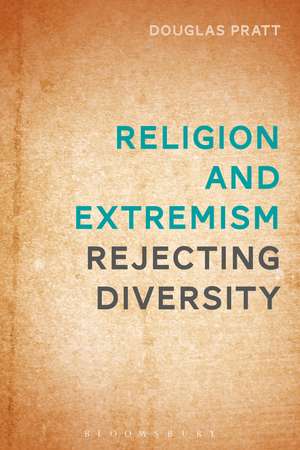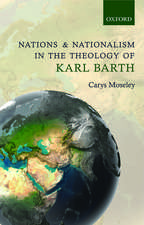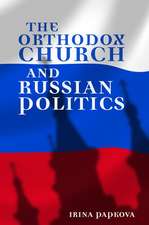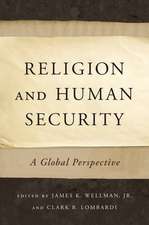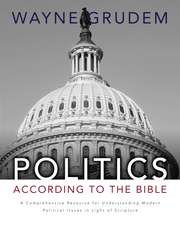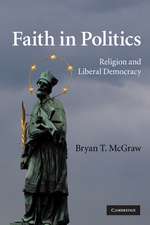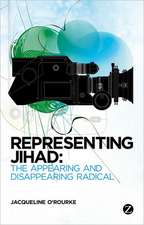Religion and Extremism: Rejecting Diversity
Autor Prof Douglas Pratten Limba Engleză Paperback – 13 dec 2017
| Toate formatele și edițiile | Preț | Express |
|---|---|---|
| Paperback (1) | 178.22 lei 22-36 zile | |
| Bloomsbury Publishing – 13 dec 2017 | 178.22 lei 22-36 zile | |
| Hardback (1) | 539.00 lei 43-57 zile | |
| Bloomsbury Publishing – 13 dec 2017 | 539.00 lei 43-57 zile |
Preț: 178.22 lei
Preț vechi: 207.24 lei
-14% Nou
Puncte Express: 267
Preț estimativ în valută:
34.10€ • 35.70$ • 28.22£
34.10€ • 35.70$ • 28.22£
Carte disponibilă
Livrare economică 17-31 martie
Preluare comenzi: 021 569.72.76
Specificații
ISBN-13: 9781474292245
ISBN-10: 1474292240
Pagini: 208
Dimensiuni: 156 x 234 x 18 mm
Greutate: 0.32 kg
Editura: Bloomsbury Publishing
Colecția Bloomsbury Academic
Locul publicării:London, United Kingdom
ISBN-10: 1474292240
Pagini: 208
Dimensiuni: 156 x 234 x 18 mm
Greutate: 0.32 kg
Editura: Bloomsbury Publishing
Colecția Bloomsbury Academic
Locul publicării:London, United Kingdom
Caracteristici
A focused overview and discussion of Judaism, Christianity and Islam that highlights the contemporary contentious issue of mutual extremism
Notă biografică
Douglas Pratt is Professor of Studies in Religion at the University of Waikato, New Zealand, and Adjunct Professor of Theology and Interreligious Studies at the University of Bern, Switzerland. He is an Associate of the Centre for the Study of Religion and Politics at the University of St Andrews, Scotland, and the New Zealand Associate, UNESCO Chair in Interreligious and Intercultural Relations Asia - Pacific.
Cuprins
Preface Acknowledgements 1. Introduction 2. Accommodating Diversity: paradigms and patterns 3. Diversity Resisted: exclusion and fundamentalism 4. Texts of Terror: scriptural motifs for extremism 5. The Jewish experience of extremism 6. Forms of Christian extremism 7. Trajectories of Islamic extremism 8. Mutual extremism: reactive co-radicalization 9. Extremism and Islamophobia 10. Conclusion Bibliography Index
Recenzii
Douglas Pratt's book Religion and Extremism cannot come at a more opportune time. Through a painstaking historical analysis Pratt demonstrates beyond doubt that all religions, including Judaism, Christianity and Islam, have had a violent past and path, whether one thinks that violence is inherent in religion, or religion has a violent core, or religion, though peaceful, can be instrumentalized as a violent means to achieve secular goals. Pratt forces adherents of all religions humbly to acknowledge this sad fact; like an addict who cannot be healed unless he or she recognizes his or her addiction, so believers cannot work for peace unless they first confess their addiction to violence. This is Pratt's uplifting message that we all need to hear.
Alarmed by violent terror in the name of religion the public, media and politicians easily get lost in the terminological morass of "radicalisation", "fundamentalism" and "extremism". Douglas Pratt's book provides a necessary, rigorous and accessible interrogation of these concepts and, by identifying a "religious absolutism" which leaves no space for theological or social diversity, he makes a distinctive contribution to debates at the crossroads of theology, sociology and political science.
Conceptually strong, and rich in examples, Pratt's book is an approachable, innovative, sophisticated analysis of contemporary religion, extremism and violence. Arguing persuasively and insightfully that extremism arises from, and can generate deadly consequences when religious exclusivists reject religious and political pluralism, and that radicalisation is a reciprocal, interactive process, Pratt shows that violence indeed begets violence. It deserves to be widely read, cited and included on many syllabi.
This thorough, thoughtful study carefully distinguishes various forms of religious fundamentalism and extremism in the Jewish, Christian, and Muslim traditions. Warning that fear of diversity can lead through reactive co-radicalization to extremist ideologies that legitimate violence, Pratt calls for a religious renewal that affirms each tradition's unique identity while affirming and accepting religious diversity in respectful dialogue. Highly recommended.
This is an excellent account of why and how extremists in the three monotheistic religions of Judaism, Christianity and Islam engage in terrorism.
Alarmed by violent terror in the name of religion the public, media and politicians easily get lost in the terminological morass of "radicalisation", "fundamentalism" and "extremism". Douglas Pratt's book provides a necessary, rigorous and accessible interrogation of these concepts and, by identifying a "religious absolutism" which leaves no space for theological or social diversity, he makes a distinctive contribution to debates at the crossroads of theology, sociology and political science.
Conceptually strong, and rich in examples, Pratt's book is an approachable, innovative, sophisticated analysis of contemporary religion, extremism and violence. Arguing persuasively and insightfully that extremism arises from, and can generate deadly consequences when religious exclusivists reject religious and political pluralism, and that radicalisation is a reciprocal, interactive process, Pratt shows that violence indeed begets violence. It deserves to be widely read, cited and included on many syllabi.
This thorough, thoughtful study carefully distinguishes various forms of religious fundamentalism and extremism in the Jewish, Christian, and Muslim traditions. Warning that fear of diversity can lead through reactive co-radicalization to extremist ideologies that legitimate violence, Pratt calls for a religious renewal that affirms each tradition's unique identity while affirming and accepting religious diversity in respectful dialogue. Highly recommended.
This is an excellent account of why and how extremists in the three monotheistic religions of Judaism, Christianity and Islam engage in terrorism.
